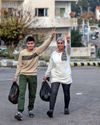
Hundreds of Haitian women lined the road at the border with Dominican Republic, each one with a brightly coloured headscarf and a bulky package balanced on her head. Some seemed far too old to be carrying such loads, others were raw-boned girls barely into their teens, all waiting in a long queue to cross back into their country.
Wiry porters pushed red-rusted wheelbarrows with loads of soft drinks or yams so high they could barely peer over them. Younger men on motorised rickshaws revved impatiently, eager to deliver their loads and rush back for more before the border closed.
The people coming and going from the market in Dajabón were in a race against the clock to cart as much food and other merchandise back to the Haitian city of Ouanaminthe amid tight new border restrictions limiting them to just two market days a week.
“Every Haitian who enters here buys merchandise to take back home so that people have something to eat,” said Noudy Dolisca, 49, a Haitian money-changer who lives in Dajabón.
The cross-border trade has long offered a commercial lifeline for families scratching a living in the parched hinterland. Four million people in the country face “acute food insecurity” and close to a million are on the brink of famine , according to the UN’s world food programme director in Haiti, Jean-Martin Bauer.
And after two weeks of surging gang violence , which on 11 March forced the resignation of prime minister Ariel Henry, the humanitarian crisis seems likely to grow more acute, especially if – as many fear – the Dominican government moves to seal the frontier.
This story is from the March 22, 2024 edition of The Guardian Weekly.
Start your 7-day Magzter GOLD free trial to access thousands of curated premium stories, and 9,000+ magazines and newspapers.
Already a subscriber ? Sign In
This story is from the March 22, 2024 edition of The Guardian Weekly.
Start your 7-day Magzter GOLD free trial to access thousands of curated premium stories, and 9,000+ magazines and newspapers.
Already a subscriber? Sign In

'It's really a disaster' The fight to save lives as gang war consumes capital
Dr James Gana stepped out on to the balcony of his hospital overlooking a city under siege. \"There's a sensation of 'What's next?'. Desperation is definitely present,\" the Médecins Sans Frontières (MSF) medic said, as he stared down at one of scores of camps for displaced Haitians in their country's violence-plagued capital.

Trailblazers The inspiring people we met around the world this year
From an exuberant mountaineer to a woman defiantly facing the guns of war, here are some of the brave individuals who gave us hope in a tumultuous 2024

Votes of confidence
From India to Venezuela and Senegal to the US, more people voted this year than ever before, with over 80 elections across the world. With rising authoritarianism and citizen-led resistance revealing its vulnerabilities and resilience in the face of unprecedented challenges, has democracy reached its breaking or turning point?

Out of touch How president sealed his own fate in martial law gambit
For Yoon Suk Yeol, this month's short-lived martial law declaration wasn't just a catastrophic miscalculation - it was the culmination of a presidency that had been troubled from the start.

Son of the soil Who is François Bayrou, the farmer turned prime minister?
François Bayrou, the new French prime minister, calls himself a country man. A tractor-driving \"son of the soil\" and breeder of thoroughbreds, he has run for president three times, saying his rural roots and centrist politics led him to try to find common ground between left and right.

Power plant workers keeping the lights on
The Guardian Weekly visits a Soviet-era coal-fired thermal installation to learn how it has held up to Russian attacks

Prince charmed Alleged spy scandal may have exposed China threat
Prince Andrew should be commended for doing Britain a great service, according to longstanding China watcher Charles Parton. The now marginalised royal has, the analyst observed, \"almost single handedly\" succeeded \"in highlighting the threat to free and open countries\" posed by the contemporary Chinese state.

In Moscow, a new life of secluded irrelevance awaits Assad
He was whisked away without a last message to his people, the aircraft's transponder deliberately switched off to avoid detection as it departed from an airbase in Syria.

'We fear new oppression' Alawites worry over rebel rule
To prepare khubeiza, the leaves of the kale-like plant must be roughly chopped and sauteed with onions, garlic and a dash of salt. According to folklore, the recipe originated among the Alawite communities who lived in Syria's mountainous coastline where the fibrous, wild-growing plant can be found in abundance. So poor were the Alawites in Ottoman times, the story goes, that the only food they could find to eat was khubeiza, which sprouts like a stubborn weed every spring.

'Gisèle is waiting for explanations'
The Pelicot rape trial has horrified the world. But as it comes to an end, the questions it has raised about French society and rape culture have still not been answered.